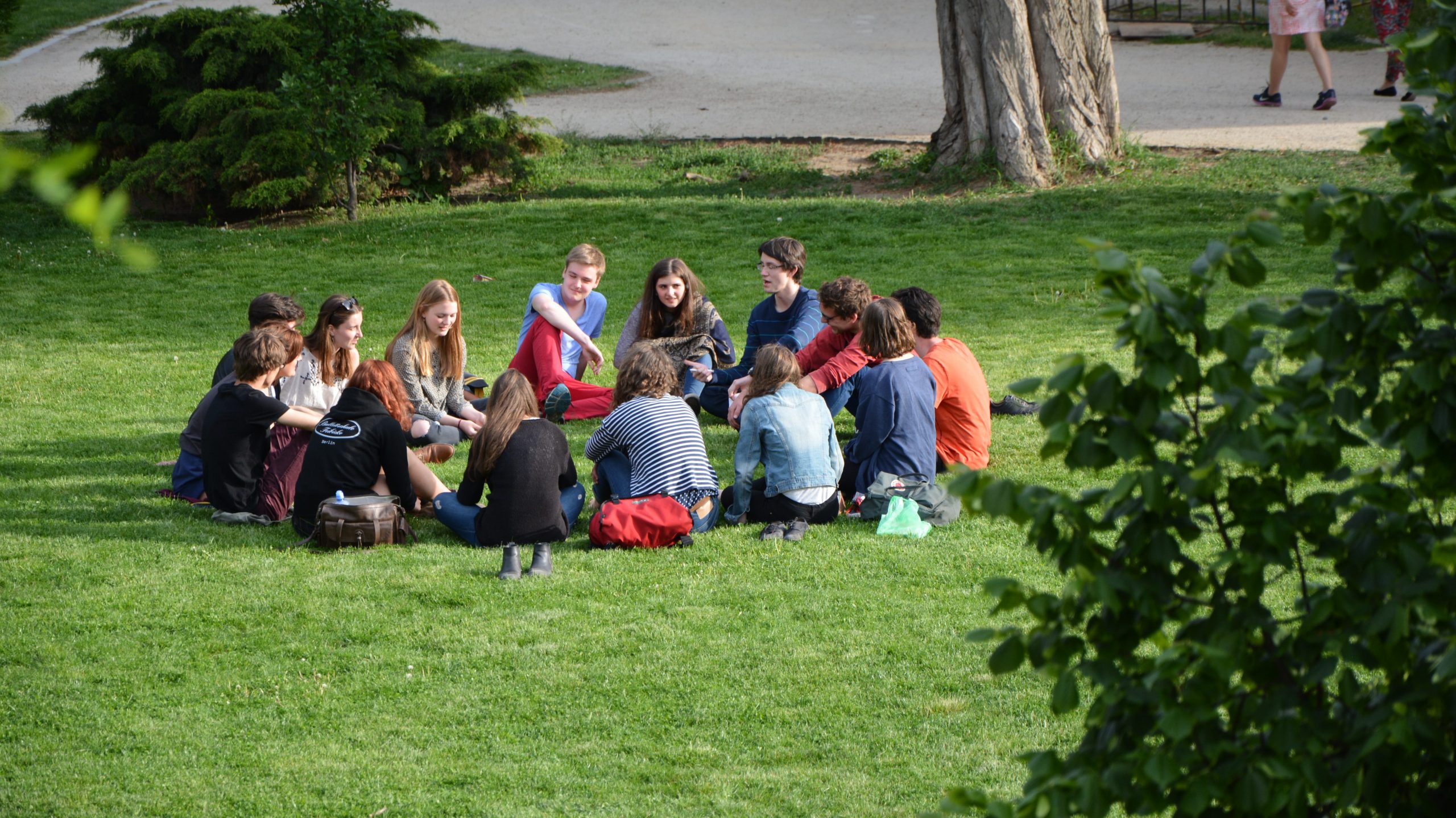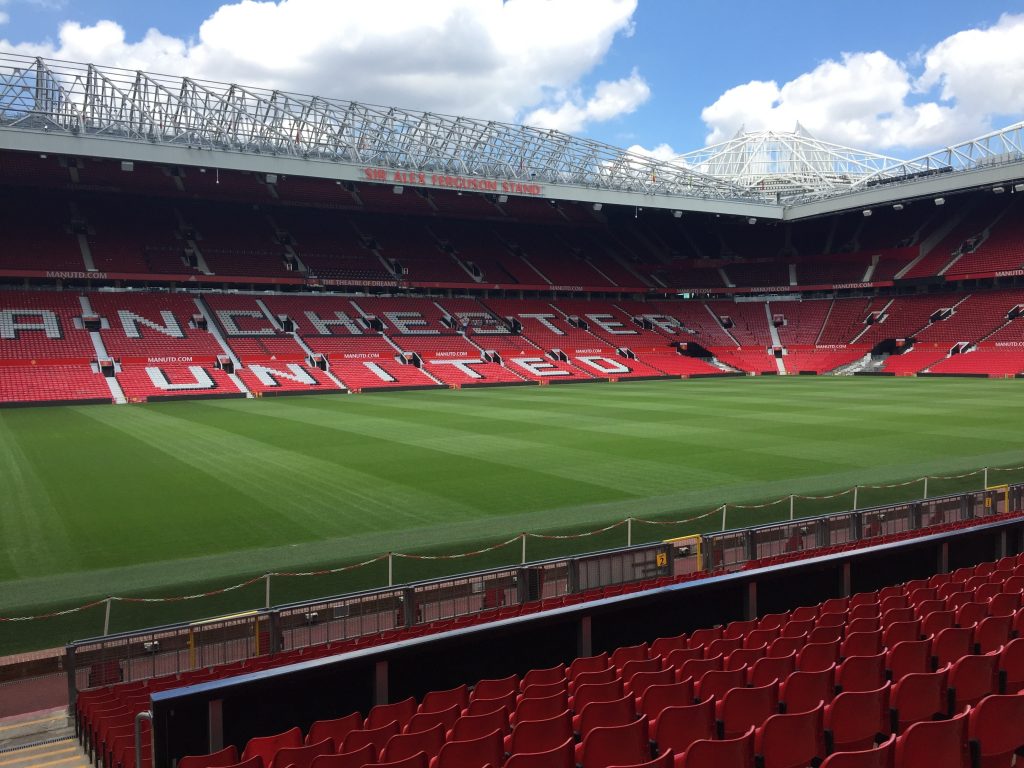Like anywhere else in the world, here in the UK, we speak quite differently to what you hear on TV, radio, and in books. It is common for people to use slang and speak in casual terms, especially around their friends and family. You may encounter slight variations in slang depending on which part of the country you’re in which can be quite confusing if English isn’t your first language.
Let’s learn about some of the common dialect terms here in the north of England – especially around Salford and Manchester, so that you can better understand what is being said or to make use of them yourself! Simply click the plus sign on the right of each slang term for an example.
Northern English slang you might hear:
1. Expressing feelings:
Buzzin’: excited
- Example “I’m buzzin’ to start uni.”
- Translation “I’m excited to start university.”
Mingin’: gross, not nice
- Example “The weather is mingin’.”
- Translation “The weather is grey and rainy, which isn’t very nice.”
Cob on: annoyed, sulking
- Example “They have a cob on.”
- Translation “They are annoyed.”
Mardy: moody
- Example “Don’t be so mardy.”
- Translation “Don’t act so moody.”
Mither: bother or fuss or moan about something
- Example “Stop mithering.”
- Translation “Stop fussing.”
Hangin’: disgusting/hungover
- Example “I’m hangin’ after going out last night.”
- Translation “I’m hungover after going out last night.”
Dodgy: potentially dangerous or unreliable
- Example “That area can get a bit dodgy at night.”
- Translation “That area can be dangerous at night.”
Fab: short for fabulous
- Example “Fab, thank you.”
- Translation “Fabulous, thank you.”
Sound: good
- Example “That plan is sound.”
- Translation “That plan is good.”
Dead: extremely, very
- Example “That is dead good.”
- Translation “That is very good.”
Fit: tasty or attractive
- Example “That sandwich was fit.”
- Translation “That sandwich was tasty.”
Sick: really good/impressive
- Example “Wow, that film was sick.“
- Translation“Wow, that film was really good.“
Smashed it: did brilliantly
- Example “You smashed it in that presentation.”
- Translation “You did very well in that presentation.”
You’re a legend: strong praise/thanks
- Example “Thanks for helping, you’re a legend.”
- Translation “Thank you for helping, that was great of you.”
Dead nice: very kind
- Example “You brought me a brew, you’re dead nice.”
- Translation “You brought me a cup of tea, you’re very kind.”

2. Daily Conversations:
Banter (bants): teasing another person in a light-hearted way
- Example “We’re just having a bit of banter.”
- Translation “We’re just playing around.”
Me: my
- Example “I’m going to me mam’s tonight.”
- Translation “I’m going to my mum’s tonight.”
Innit?: short for (isn’t it?)
- Example “It’s cold today innit?”
- Translation “It’s cold today isn’t it?”
Bloke: man
- Example “He is a nice bloke”.
- Translation “He is a nice man.”
Bits ‘n bobs’: small tasks/ random little items
- Example: “I’ve got a few bits and bobs to do.“
- Translation “I’ve got some stuff to do.“
Proper: correct/very
- Example “That is a proper cup of tea”.
- Translation “That is a good cup of tea.”
Job’s a good’un: nicely finished, all done
- Example “We’ve submitted the form, job’s a good’un.”
- Translation “We’ve submitted the form, it’s completed well.””
Sorted: fixed/taken care of
- Example: “I’ve got a few bits and bobs to do.“
- Translation “I’ve got some stuff to do.“
Ducks in a row: everything organised
- Example “Let’s get our ducks in a row before the meeting.”
- Translation “Let’s organise everything before the meeting.”
Love: kind term used to refer to someone
- Example “You alright love?”
- Translation “How are you?” (friendly)
Daft: Silly
- Example “Don’t be daft.”
- Translation “Don’t be silly.”
Ar kid: younger sibling or friend
- Example “Ar’ kid’s there .”
- Translation “My younger sibling/friend is there.”
Done and dusted: completed
- Example “The deal is done and dusted.”
- Translation “The deal is completed.”
Alright cock?: greeting a friend/term of endearment
- Example “Alright cock?”
- Translation “Hello friend/how are you, friend?”
Posh: elegant or stylishly luxurious
- Example “He talks posh”
- Translation “He talks elegantly.”
Ginnel: alleyway
- Example “As I walked down the ginnel, I saw my mate”.
- Translation “As I walked down the alley, I saw my friend.”
Tenner: £10
- Example “I got this shirt for a tenner.”
- Translation “I got this shirt for £10.”
Fiver: £5
- Example “How much is it? A fiver.”
- Translation “How much is it? £5.”
Quid: a pound
- Example “Could you lend me twenty quid?”
- Translation “Could you lend me twenty pounds?”
Nowt: nothing
- Example “I’ve got nowt to worry about.”
- Translation “I’ve got nothing to worry about.”
Fresher: a first year university student
- Example “Will you go to the fresher’s fair?”
- Translation “Will you go to the fair that is for first year university students?”
The day ran away from me: time went very fast
- Example “Sorry for the late reply, the day ran away from me.”
- Translation “Sorry for the late reply, time passed very quickly.”
Hang fire (on something): wait/hold off for now
- Example “Hang fire on booking trains until we get dates.”
- Translation “Please wait to book trains until we know the dates.”
Chance it: take a risk/give it a try
- Example “No tickets left online, shall we chance it at the door?”
- Translation “There are no tickets online, should we try our luck at the door?”
Ta: thanks
- Example “Ta for the notes.”
- Translation “Thank you for the notes.”
Soz: sorry (casual)
- Example “Soz I’m late, bus was packed.”
- Translation “Sorry I’m late, the bus was very full.”
Tad: a little bit
- Example “I’m a tad busy right now.”
- Translation “I’m a little bit busy right now.”

3. Food-related terms:
Brew: cup of tea
- Example: “Make us a brew.”
- Translation: “Please can you make me a cup of tea?”
Tea: last meal of the day, also known as dinner
- Example “What time are you having your tea?”
- Translation “What time are you eating your dinner?”
Chuddy: chewing gum
- Example “Give us a chuddy.”
- Translation “Please can I have a chewing gum?”
Dinner: midday meal, also known as lunch
- Example “It’s dinner time.”
- Translation “It’s lunch time.”
Barm cake: soft bread roll
- Example “Could I have a bacon barm?”
- Translation “Could I have a bacon roll?”
Scran: another word to describe food
- Example “That’s good scran.”
- Translation “That’s good food.”
4. Clothing-related terms:
Kecks: trousers
- Example “I like your new kecks.”
- Translation “I like your new trousers.”
Salfords: socks (Mancunian rhyming slang for socks – ‘Salford Docks’)
- Example “Pull up your salfords.”
- Translation “Pull up your socks.”
Clobber: clothing
- Example “I need to change my clobber before we go out.”
- Translation “I need to change my clothes before we go out.”
5. Salford/Manchester common terms:


Manc: abbreviation of Manchester
- Example “I’m heading into Manc later.”
- Translation “I’m heading into Manchester later.”
United: Manchester United football club
- Example “Did you see the United game last night?”
- Translation “Did you see the Manchester United game last night?”
City: Manchester City football club
- Example “City played brilliantly last week.”
- Translation “Manchester City played brilliantly last week.”
Red or blue: reference to supporting Manchester City (blue) or Manchester United (red)
- Example “Whether you’re a red or a blue, it’s an exciting game.”
- Translation “Whether you’re a Manchester United or a Manchester City supporter, it’s an exciting game.”
With these slang terms, you’ll be a proper Manc in no time. We know we didn’t cover everything here so, if you hear a word or phrase you don’t recognise, don’t forget to comment them below! Who knows, we might even have to do a part two…
Does anyone know the origin of the following saying. ‘It’s a whip wap for a wowser to wind the sun in’ ? I’ve been searching for the explanation as it’s a saying that my gran used frequently when I was a child. She was born in 1901, I knew her since I was born in 1969. I’d love to know the origin. Any help greatly appreciated.
We’re not sure of that one! We’ll leave it here to see if anyone else knows the origins. In what context did your gran use it?